kottke.org posts about iPod

To mark the 20th anniversary of the iPod, Cabel Sasser shared some photos of one of the coolest artifacts in the Panic Archives: a prototype of the original iPod.
As you can see, it’s… quite large! We’ve always assumed that this mighty shell was designed to fit the large breadboards or circuit boards that were used during the earliest days of iPod development, until everything was eventually sized down to actual iPod-size. (It also has the Jobsian side-benefit of keeping the engineers in the dark about what the final device will look like.) I can’t get enough of those chunky, clunky, clicky black buttons wired up for navigation.
You can see how big it actually is when compared to the size of the actual iPod:
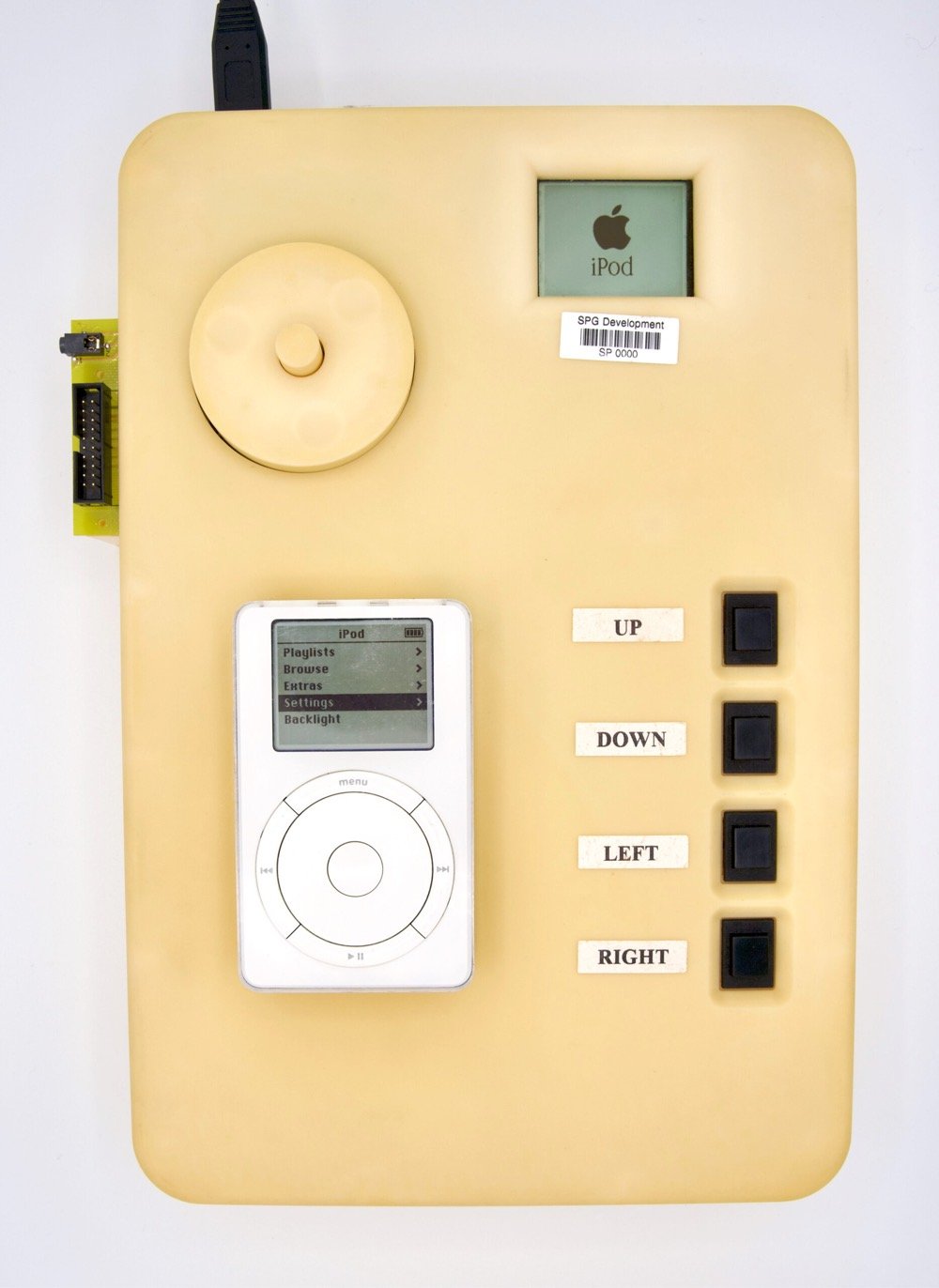
Update: Tony Fadell headed up development of the iPod at Apple and had this to say about the prototype above:
This is a P68/Dulcimer iPod prototype we (very quickly) made before the true form factor design was ready. Didn’t want it look like an iPod for confidentiality — the buttons placement, the size — it was mostly air inside — and the wheel worked (poorly)
How to charge your iPod using just an onion and some Gatorade. Oh yeah? When we were kids, we ran digital clocks off of potatoes and loved it! Fear the power of the tuber!
Update: It’s a myth, busted by Mythbusters no less. Like I said, tubers rule. (thx, everyone)
Before each race during the Olympics, Michael Phelps is seen sporting those ubiquitous white iPod earbuds. But what’s he listening to? A lot of rap and hip hop.
Two bits (bites? har har) of Apple news:
1. Steve Jobs has announced that an SDK will be available for the iPhone and iPod touch in February. No more hacking your phone to put applications on it.
2. You can now preorder OS X 10.5 (Leopard) at Amazon for $109…that’s $20 off the retail price. The offer comes with a pre-order price guarantee; if the price drops before it ships, you get it for the lower price.
My friend David Galbraith just launched a gadget site called Oobject. The gadgets are organized into hierarchically ordered collections and you can vote on the position of a particular gadget within the collection. Two of my favorite collections are the iPod knock-offs and revolting gold gadgets (it’s interesting that gold makes technology look vulgar and therefore cheap).
Oh, and David’s Smashing Telly is still cranking along nicely. I wish I had time to watch all the shows featured recently.
Apple is holding a special event today at 10am PT to announce a new product. Or something. No one knows exactly what but it seems to have something to do with music. Popular guesses include a 3G iPhone, a different iPod nano, a touchscreen iPod, and the availability of the Beatles entire musical catalog on iTunes. MacWorld, Engadget, MacObserver, and ArsTechnica (among others) will have live coverage.
Update: Jobs announced 99-cent ringtones, new colors for iPod shuffle, new form factor for iPod nano (fat vs. thin), renamed the iPod to iPod classic, introduced new iPod touch (basically the iPhone without the phone), new mobile iTunes Music Store that will work on iPod touch and the iPhone, odd partnership with Starbucks…click to buy currently playing songs in the store and free wifi for iTMS purchases (how about free wifi, period?), and the 8GB iPhone now costs $399. !!!!! I guess Apple’s plan on that was 1) gouge all the early adopters, and then 2) reduce the price to sell iPhones like crazy.
Long profile of Steve Jobs on the eve of his fourth act written by John Heilemann, who is one of my favorite technology/culture writers. I’m dying to find out what past Jobs-championed Apple product the iPhone will most resemble: the Lisa or the iPod?
The Fat Duck, one of molecular gastronomy’s main outposts, recently offered a course complete with its own soundtrack served up on iPods shuffle. “Heston Blumenthal, the chef, said he wanted to experiment with using sound to enhance a dining experience. Hence the iPod, playing the soothing sound of the sea breeze and waves gently caressing the seashore.”
Tourism, iPod-created personal environments, and the death of peripheral vision. “I was brought up to be constantly aware of others around me, to keep a sharp eye out to see if I was blocking someone’s way, holding someone up.”
OhMiBod is the ultimate iPod accessory: a vibrator that hooks up to the iPod and buzzes in time with the music. “I will never listen to music the same way again.” Don’t miss the playlists compiled specifically for OhMiBod use. NSFW. (thx, tania)
Regarding some of the points in my iPhone round-up from yesterday, David Pogue has some answers to those questions and a whole lot more in his iPhone FAQ. “Is it ambidextrous? -No.” What does that even mean? As a lefty, am I out of luck? (via df)
By now you’ve all heard about the iPhone and read 60 billion things about it, so I’ll get straight to it. I’ve been tracking some of the best points from around the web and jotted down some thoughts of my own.
Caveat: Evaluating an interface, software or hardware, is difficult to do unless you have used it. An interface for something like a mobile phone is something you use on the time-scale of weeks and months, not minutes or hours. There are certain issues you can flag as potential problems, challenges, or triumphs after viewing demos, descriptions of functions, and the like, but until you’re holding the thing in your hand and living with it day-to-day, you really can’t say “this is going to work this way” or “I don’t like the way that functions” with anything approaching absolute confidence. With that said:
- In his keynote announcing it, Steve Jobs said the killer app for the iPhone was voice. The thing is, many people you talk to who are are under 35 use their phones more and more for text and less and less for voice. Same thing for Treo and Blackberry aficionados. Does the text entry via the touchscreen work as well as text entry via a mini keyboard? The tactility of raised buttons provides a lot of feedback to the typer’s fingers that a touchscreen does not. (Jason Fried said: “When you touch the [iPhone] it doesn’t touch you back.”) Can you type on it with your thumbs? What about if your thumbs are large? I know people who can text without looking at the keypad and/or Blackberry keyboard, that’s out the window with the touchscreen. Can you dial with one hand?
The touchscreen text entry is the biggest issue with the iPhone. If it works well, the iPhone has a good shot at success, and if not, it’s going to be very frustrating for those that rely on their mobile for text…and every potential customer of the iPhone is going to hear about that shortcoming and shy away.
- The price is pretty high. So was the price for the first iPod. And the Macintosh. Apple will approach this in a similar way to the iPod…start with a premium product at the high end and work their way down to shuffle-land. It isn’t difficult to imagine an iPhone nano that just does voice, SMS, music, and a camera. (Or an iPhone shuffle…you press the call button and it randomly calls someone from the ten contacts the shuffle synched from your computer that morning.)
- I guess we know why iPod development has seemed a little sluggish lately. When the Zune came out two months ago, it was thought that maybe Apple was falling behind, coasting on the fumes of an aging product line, and not innovating in the portable music player space anymore. I think the iPhone puts this discussion on the back burner for now. And the Zune? The supposed iPod-killer’s bullet ricocheted off of the iPhone’s smooth buttonless interface and is heading back in the wrong direction. Rest in peace, my gentle brown friend.
- How long before the other iPods start working like the iPhone? I imagine a widescreen video iPod with touchscreen but without a phone, wifi, camera, etc. will be introduced at some point after the iPhone comes out in June. Without the need for the clickwheel, the shape of the video and nano iPods becomes much more flexible. If they can cram all the memory and electronics into a smaller space, the nano could be half its current height with a touchscreen.
- What’s really kind of sad about the intensely exuberant reaction to the iPhone is that the situation with current mobile phones are so bad in the first place. It’s not like we didn’t see any of this coming or couldn’t imagine the utility of the iPhone’s features. Visual voicemail is a good idea, but the reason Nokia or Motorola didn’t introduce it years ago is that the carriers (Sprint, Verizon, T-Mobile, etc.) don’t want to support it despite its obvious utility and ease of implementation. (T-Mobile sends my Nokia phone a text message every time I get a voicemail…what could be simpler than sending the number along with it and shunting those messages to a special voicemail app on the phone to see a list of them? Listening to them out of sequence would be a bit harder, but doable. Blackberry announced they were doing this back in 2005.) Integrated Google Maps, email, and search makes obvious sense too. As for the touchscreen, we’ve all seen Jeff Han’s work on multi-touch interaction, Minority Report, and Wacom’s Cintiq, not to mention the mousepads on the MacBooks and the iPod’s clickwheel. The Japanese are pretty unimpressed with the whole thing.
What *is* fantastic about the iPhone is the way that they’ve put it all together; features are great, but it’s all about the implementation. Apple stripped out all the stuff you don’t need and made everything you do need really simple and easy. (That’s the way it appears anyway…see above caveat.)
- Regarding the above, a relevant passage from a Time magazine article on how the iPhone came about:
One reason there’s limited innovation in cell phones generally is that the cell carriers have stiff guidelines that the manufacturers have to follow. They demand that all their handsets work the same way. “A lot of times, to be honest, there’s some hubris, where they think they know better,” Jobs says. “They dictate what’s on the phone. That just wouldn’t work for us, because we want to innovate. Unless we could do that, it wasn’t worth doing.” Jobs demanded special treatment from his phone service partner, Cingular, and he got it. He even forced Cingular to re-engineer its infrastructure to handle the iPhone’s unique voicemail scheme. “They broke all their typical process rules to make it happen,” says Tony Fadell, who heads Apple’s iPod division. “They were infected by this product, and they were like, we’ve gotta do this!”
- From the video, it looks like it take four clicks (after unlocking the phone) to make a phone call. For everyday use, that seems excessive. I hope there’s going to be some sort of speed dial mechanism…with my current phone, pressing “2” and then “send” calls my wife (which I can basically do without looking, BTW).
- I don’t know what the state of the art is in voice recognition these days, but I’m a little surprised that’s not an input option here. To call someone, you say their name (my current phone does this). To text someone, you speak the message and they get the text on their end. Speaking “Google Maps, sushi near 10003” would have the expected result.
- Or maybe drawing graffiti on the screen with your fingers and other gestural input methods? You could have different swipes and taps as a speed dial mechanism…swipe the screen from top left to bottom right and then tap in the lower right hand corner to call mom, that sort of thing. Or Morse code maybe? ;)
- The OS X included with the phone obviously isn’t the version that’s running on my Powerbook right now. John Gruber proves that footnotes are often more interesting than the referring text and offers this little tidbit:
That is to say the core operating system at the core of Mac OS X, the computer OS used in Macs, and “OS X”, the embedded OS on the iPhone. More on this soon in a separate fireball, but do not be confused: Mac OS X and OS X are not the same thing, although they are most certainly siblings. The days of lazily referring to “Mac OS X” as “OS X” are now over.
Several people have speculated that the iPhone’s version of OS X is actually a preview of what we’ll be getting with Leopard, the next version of Mac OS X.
- Lance warns us of the dreaded version 1.0 hardware from Apple.
- My favorite thing about the iPhone is the Google Maps integration. I would use that at least 4-5 times a week.
- Will phone numbers and addresses detected on web pages in Safari be clickable? Click to dial a phone number, click to look up an address with Google Maps, that sort of thing. Update: There’s a video online somewhere (anyone?) of a demo that shows a URL in an email and/or text message that’s clickable. (thx, Deron)
- The resolution of the screen on the iPhone is 160 ppi. People who have seen it close up report that the screen is extremely crisp and clear. Apple displays have been higher than 72 ppi for quite awhile, now but not as high as 160. How soon can we expect 160 ppi on the MacBooks?
- Double the width of the iPhone and you’ve got the iTablet. 640x480, a bigger virtual keyboard to type on, etc. Just a thought.
- My friend Chris suggested that it should ship with a dock that hooks directly to a monitor. Attach a keyboard and mouse to the monitor and voila!, you’ve got the world’s smallest portable computer.
- iPhone trademark dispute between Apple and Cisco: booorrrrr-ring.
- This is one of the biggest questions in the hardcore technology community: will Apple allow 3rd party development of widgets and apps for the iPhone? Right now it seems like they might not, but there’s a lot of speculation in the absence of information going on. It sure would be nice if they did, but Apple doesn’t have a good track record here. I bet the Dodgeball and Upcoming folks are looking at the integrated Google Maps and wishing they could integrate their apps in the same way. (And Flickr too!)
- Games! A no-brainer. Probably lots you can do with the motion sensors and proximity detectors, not to mention the touchscreen. Although the touchscreen does make it difficult to see and control the onscreen action at the same time. How would you play Pac-Man on the iPhone?
- Available in more than one color? Probably a few months after launch…or it could be right away.
- Parallels running on the iPhone was a joke, folks. Just pulling your ARM.
- Don’t you think that maybe every company should fire their founders after a few years and then hire them back a few years later? I mean, how crazy is it that Apple birthed the Apple II and the Macintosh — each a significant achievement that taken alone would have sealed Apple’s reputation for innovation in the history of computing — and then fired the guy that got them there, stumbled badly enough that they were heading for mediocrity and obscurity, and then brought Jobs back, who spurred a string of successes that has nearly overshadowed the company’s earlier achievements: OS X, the iMac, the iBooks/PowerBooks/MacBooks, the iPod, iTMS, and now the iPhone. It’s insane! Not to mention fun to watch. Perhaps Google should fire Larry and Sergey with the idea that they’ll take them back in a few years when they’re a little older, a little wiser, a little more seasoned in business, with a new perspective, and possessing an enormous amount of motivation to prove that their dismissal was a bad move.
- My favorite comment from the Digg thread about the model iPhone I made out of cardboard: “Nothing says you’ve never kissed a girl like toting around a paper iPhone.”
- From the Time article, a quote from Steve Jobs about how Apple does business: “Everybody hates their phone and that’s not a good thing. And there’s an opportunity there.”
- Interesting thoughts from Adam Baer in the wake of the iPhone announcement:
Apple has figured out a way to retain a hold on hearts and minds in a business previously based on bytes. I applaud its designs, I worry about its tactics and what they mean for the future of marketing and group think. A group that wants our devotion but doesn’t need the press, doesn’t want the press, can’t keep the press off its backs, is a group that’s more interested in mind control than in improving lives with its products.
- Some miscellaneous links: Watch the MacWorld keynote with the iPhone announcement. Fortune piece on how Apple kept the iPhone a secret for two years. David Pogue got an hour of hands-on time with the iPhone. The Digg post of the announcement got almost 20,000 diggs, more than 1,400 comments, and nearly crashed my browser when I went to look at it.
And that’s enough, I think.
David Denby had a great piece in the New Yorker last week about the present and future of movies. I was surprised to learn that Hollywood hates the movie theater-going experience as much or more than the rest of us:
Consider the mall or the urban multiplex. The steady rain of contempt that I heard Hollywood executives direct at the theatres has been amplified, a dozen times over, by friends and strangers alike. The concession stands were wrathfully noted, with their “small” Cokes in which you could drown a rabbit, their candy bars the size of cow patties; add to that the pre-movie purgatory padded out to thirty minutes with ads, coming attractions, public-service announcements, theatre-chain logos, enticements for kitty-kat clubs and Ukrainian bakeries-anything to delay the movie and send you back to the concession stand, where the theatres make forty per cent of their profits. If you go to a thriller, you may sit through coming attractions for five or six action movies, with bodies bursting out of windows and flaming cars flipping through the air-a long stretch of convulsive imagery from what seems like a single terrible movie that you’ve seen before. At poorly run multiplexes, projector bulbs go dim, the prints develop scratches or turn yellow, the soles of your shoes stick to the floor, people jabber on cell phones, and rumbles and blasts bleed through the walls.
If we want to see something badly enough, we go, of course, and once everyone settles down we can still enjoy ourselves. But we go amid murmurs of discontent, and the discontent will only get louder as the theatre complexes age. Many of them were randomly and cheaply built in response to what George Lucas conclusively demonstrated with “Star Wars,” in 1977: that a pop movie heavily advertised on national television could open simultaneously in theatres across the country and attract enormous opening-weekend audiences. As these theatres age, the gold leaf doesn’t slowly peel off fluted columns. They rot, like disused industrial spaces. They have become the detritus of what seems, on a bad day, like a dying culture.
Denby also considers what happens to movies when the primary target audience (12-30 year-olds make up 50% of the movie-going population) may prefer to watch movies on DVD, their computers, or on iPods.
No exhibition method is innocent of aesthetic qualities. Platform agnosticism may flourish among kids, but platform neutrality doesn’t exist. Fifty years ago, the length of a pop single was influenced by what would fit on a forty-five-r.p.m. seven-inch disk. The length and the episodic structure of the Victorian novel — Dickens’s novels, especially — were at least partly created by writers and editors working on deadline for monthly periodicals. Television, for a variety of commercial and spatial reasons, developed the single-set or two-set sitcom. Format always affects form, and the exhibition space changes what’s exhibited.
As a fan of watching movies on the big screen of a theater, I hope that sort of movie making doesn’t go away anytime soon.
Comparison of the iPhone with other smart phones…a nice companion piece to the comparison of my cardboard iPhone to various iPods, mobile phones, etc. So far, the market thinks that Apple’s got something good on their hands: Apple stock was up $7.10 today while RIMM (makers of Blackberry) dropped $11.16.
Apple’s new iPhone looks like a thing of beauty. Widescreen touch interface, no buttons, runs OS X, useful widgets, integrated email, Google Maps, Google/Yahoo search, visual voicemail (see who voicemail is from before you call), SMS, Wifi, etc. etc. Oh, and it plays music.
A lot of people are wondering just how big this thing is. Using the technical specs from apple.com, I grabbed some cardboard, scissors, and glue and made a scale model of the iPhone. Here it is:
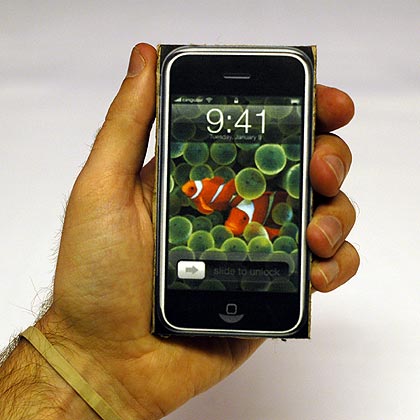
My hands aren’t that big (I can barely palm a basketball on a good day), but it still seems to fit pretty well. How does it stack up against similar devices?
Here’s the iPhone vs. my current mobile phone, the Nokia 7610:
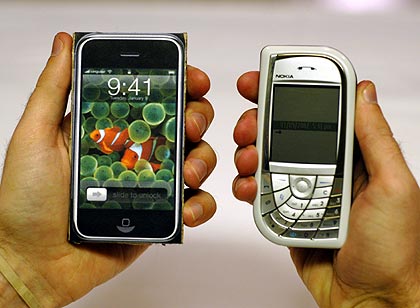
iPhone vs. a 5G iPod:
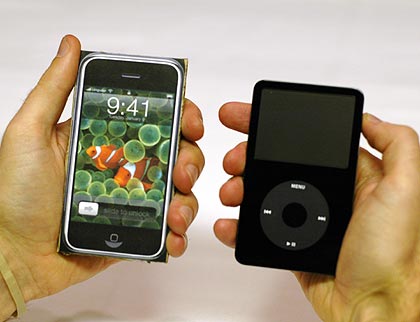
Thickness of the cardboard iPhone vs. the 5G iPod:

1G iPod shuffle, 3G iPod, 5G iPod and the iPhone:
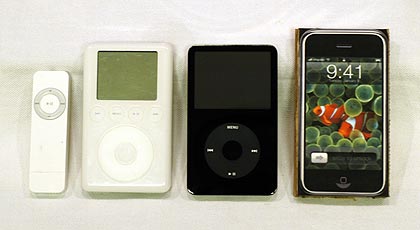
iPhone vs. a TiVo remote and a Wii remote:


That’s all the gadgets I could find on a couple of hours notice.
I also dug up something I wrote a couple of years ago in the gigantic text file I keep on my Powerbook of ideas for kottke.org posts. 99% of the stuff in that file is completely dunderheaded, but I have to say I hit close to the mark on this one:
true convergence of phone + mp3 player will happen when someone solves this user experience puzzle: physically not enough room for two optimized interfaces (one for calls, one for music) on same small device. possible solution: no buttons, replace with touch screen that covers the whole front with one-touch switching between modes…
Once we’re able to get our hands on it and use the interface, the iPhone could turn out to be a disappointment, but they’re heading in the right direction at least. More thoughts soon.
(Like this story? Digg it.)
David echoes my reaction to seeing a Zune in person for the first time this weekend: “I just saw a Zune, and guess what? Its a piece of shit.” I usually give people a hard time for making snap judgments about technology that takes time to get to know (comments like “this interface sucks” after 20 seconds of use make my eyes go rolling), but the Zune…it’s like the story of the Getty’s Greek kouros that Gladwell tells in Blink: one look and you know it’s wrong. Andre has been trying a Zune out for the last couple of weeks and doesn’t mind it even though he’s giving up on it.
Merlin Mann recently wrote two posts about managing your music library using iTunes Smart Playlists. His suggestions for making music-only playlists (for those that have a lot of podcasts & audiobooks in their libraries) and the “sure you really like that?” playlist are especially helpful. One of my recent favorite Smart Playlists is helpful for discovering good stuff that I haven’t listened to in awhile:

The Last Skipped bit is in there because while listening to this playlist, I found myself skipping stuff I didn’t want to hear and that rule gets it out there so that it doesn’t come up again. An item on my Smart Playlist wishlist is the ability to measure popularity acceleration (basically, something like “gimme the most played over the last week”), but there’s no way (that I can find) to ask iTunes how many times a song has been played in the last x days.
Several more Smart Playlist suggestions are available at smartplaylists.com and Andy Budd.
Handbrake is an OS X application that will, among other things, rip DVD video to a files that will play on an iPod (how to). However, I’ve found that this takes an absurd amount of time…2.5 hours for a 1.5 hour-long movie (on a 1.67 Ghz Powerbook with 2 GB RAM). Are there faster options out there?
MacRumors has live coverage of the “September 12th Apple Media Event” (exciting name!). Announced so far: new smaller iPods (but with more storage), iTunes 7, and games for sale at the iTunes Music Store.
Olympic snowboarders competed while listening to their iPods. The goal? Effortless concentration. “It enables you to focus on what you’re doing without actually focusing, if that makes any sense. You’re not over-thinking, and that’s the best way to perform the harder tricks and maneuvers.”
There’s been lots of talk on the web lately about Digg being the new Slashdot. Two months ago, a Digg reader noted that according to Alexa, Digg’s traffic was catching up to that of Slashdot, even though Slashdot has been around for several years and Digg is just over a year old. The brash newcomer vs. the reigning champ, an intriguing matchup.
Last weekend, a piece on kottke.org (50 Fun Things to Do With Your iPod) was featured on Digg and Slashdot[1] and the experience left behind some data that presents a interesting comparison to the Alexa data.
On 1/7 at around 11:00pm ET (a Saturday night), the 50 Things/iPod link appeared on Digg’s front page. It’s unclear exactly what time the link fell off the front page, but from the traffic pattern on my server, it looks like it lasted until around 2am Sunday night (about 3 hours). As of 10pm ET on 1/11, the story had been “dugg” 1387 times[2], garnered 65 comments, and had sent ~20,000 people to kottke.org.
On 1/8 at around 5pm ET (a Sunday afternoon), the 50 Things/iPod link appeared on Slashdot’s front page and was up there for around 24 hours. As of 10pm ET on 1/11, the story has elicited 254 comments and sent ~84,100 people to kottke.org.
Here’s a graph of my server’s traffic (technically, it’s a graph of the bandwidth out in megabits/second) during the Digg and Slashdot events. I’ve overlaid the Digg trend on the Slashdot one so you can directly compare them:

That’s roughly 18 hours of data…and the scales of the two trends are the same. Here’s a graph that shows the two events together on the same trend, along with a “baseline” traffic graph of what the bandwidth approximately would have been had neither site linked to kottke.org:
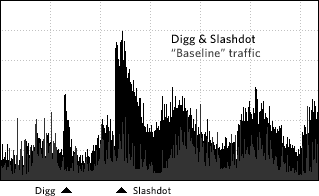
That’s about 4.5 days of data. Each “bump” on the baseline curve is a day[3].
The two events are separated by just enough time that it’s possible to consider them more or less separately and make some interesting observations. Along with some caveats, here’s what the data might be telling us:
- The bandwidth graphs represent everything that was happening on the kottke.org server during the time period in question. That means that bandwidth from all other outgoing traffic is on there, mixed in with that caused just by the Digg and Slashdot traffic. According to my stats, no other significant events happened during the period shown that would cause unusual amounts of bandwidth to be consumed. Including the baseline traffic (from mid-December actually) on the second graph is an attempt to give you an idea of what it looks like normally and so you can see what effect the two sites had on the traffic.
- The Digg link happened late Saturday night in the US and the Slashdot link occurred midday on Sunday. Traffic to sites like Slashdot and Digg are typically lower during the weekend than during the weekday and also less late at night. So, Digg might be at somewhat of a disadvantage here and this is perhaps not an apples to apples comparison.
- I’m pretty sure that the person who submitted this link to Slashdot got it from Digg or at least from a site that got it from Digg. Bottom line: if the iPod thing, which is several months old, hadn’t been Dugg, it would not have appeared on Slashdot the next day.
- If you look at the first 16-18 hours of the link being both sites (first graph), you’ll see that the traffic from Slashdot was initially larger and stayed large longer than that from Digg. Stories appear to stay on the front page of Slashdot for about a day, but the churn is much faster on Digg…it only lasted three hours and that was late on a Saturday night.
- Slashdot sent roughly 4 times the traffic to kottke.org than Digg did since Saturday.
- If you look at the second graph, Slashdot appears to have a significant “aftershock” effect on the traffic to kottke.org. The traffic went up and stayed up for days. In contrast, the traffic from Digg fell off when the link dropped off the front page and increased traffic a little the next day (compared to the baseline) before Slashdot came and blew the doors off at 4pm. Some of this difference is due to the late hour at which the link was Dugg and how much longer the link remained on the Slashdot front page. But that doesn’t account for the size and duration of the aftershock from Slashdot, which is going on three days now.
- The traffic from the Slashdot link obscures any secondary Digg effect beyond 16-18 hours. But the bump in traffic (if any) from Digg on Sunday afternoon pre-Slashdot was not that large and was declining as the afternoon wore on, so any possible Digg aftershock that’s obscured by the Slashdot link is minimal and short-lived.
- I’m guessing the Slashdot aftershock is due to 1) traffic from links to kottke.org from other blogs that got it from Slashdot (from blogs that got it from those blogs, etc.), 2) people passing the link around via email, etc. after getting it from Slashdot, 3) Slashdot visitors returning to kottke.org to check out other content, and 4) an embedded Digg mini-aftershock of linkers, emailers, and repeat visitors. The del.icio.us page for the 50 ways/iPod link shows that before 1/8, only a few del.icio.us users per day were bookmarking it, but after that it was dozens per day.
In terms of comparing this with the Alexa data, it’s not a direct comparison because they’re measuring visitors to Digg and Slashdot, and I’m measuring (roughly) visitors from each of those sites. From the kottke.org data, you can infer how many people visit each site by how many people visited from each site initially…the bandwidth burst from Slashdot was roughly about 1.8 times as large as Digg’s. That’s actually almost exactly what Alexa shows (~1.8x).
But over a period of about 4 days, Slashdot has sent more than 4 times the number of visitors to kottke.org than Digg — despite a 18-hour headstart for Digg — and the aftershock for Slashdot is much larger and prolonged. It’s been four days since the Slashdotting and kottke.org is still getting 15,000 more visitors a day than usual. This indicates that although Digg may rapidly be catching up to Slashdot traffic-wise, it has a way to go in terms of influence[4].
Slashdot is far from dying…the site still wields an enormous amount of influence. That’s because it’s been around so long, it’s been big, visible, and influential for so long, and their purpose is provide their audience with 20-25 relevant links/stories each day. The “word-of-mouth” network that Slashdot has built over the years is broad and deep. When a link is posted to Slashdot, not only do their readers see it, it’s posted to other blogs (and from there to other blogs, etc.), forwarded around, etc. And those are well-established pathways.
In contrast, Digg’s network is not quite so broad and certainly less deep…they just haven’t been around as long. Plus Digg has so much flow (links/day) that what influence they do have is spread out over many more links, imparting less to each individual link. (There are quite a few analogies you can use somewhat successfully here…the mafia don who outsmarts a would-be usurper because of his connections and wisdom or the aging rock group that may currently be less popular than the flavor of the month but has collectively had a bigger influence on pop music. But I’ll leave making those analogies as an exercise to the reader.)
What all this suggests is that if you’re really interested in how influence works on the web, just looking at traffic or links doesn’t tell you the whole story and can sometimes be quite misleading. Things like longevity, what the social & linking networks look like, and how sites are designed are also important. The Alexa data suggests that Digg has half the traffic of Slashdot, but that results in 4x the number of visitors from Slashdot and a much larger influence afterwards. The data aside, the Digg link was fun and all but ultimately insignificant. The Slashdot link brought significantly more readers to the site, spurred many other sites to link to it, and appears to have left me with a sizable chunk of new readers. As an online publisher, having those new long-term readers is a wonderful thing.
Anyway, lots of interesting stuff here just from this little bit of data…more questions than conclusions probably. And I didn’t even get into the question of quality that Gene brings up here[5] or the possible effect of RSS[6]. It would be neat to be a researcher at someplace like Google or Yahoo! and be able to look more deeply into traffic flows, link propagation, different network topologies, etc. etc. etc.
[1] The way I discovered the Digging and Slashdotting was that I started getting all sorts of really stupid email, calling me names and swearing. One Slashdot reader called me a “fag” and asked me to stop talking about “gay ipod shit”. The wisdom of the crowds tragedy of the commons indeed.
[2] On Digg, a “digg” is a like a thumbs-up. You dig?
[3] That’s the normal traffic pattern for kottke.org and probably most similar sites…a nearly bell-shaped curve of traffic that is low in the early morning, builds from 8am to the highest point around noon, and declines in the afternoon until it’s low again at night (although not as low as in the morning).
[4] The clever reader will note here that Slashdot got the link from Digg, so who’s influencing who here? All this aftershock business…the Slashdotting is part of the Digg aftershock. To stick with the earthquake analogy though, no one cares about the 5.4 quake if it’s followed up by a 7.2 later in the day.
[5] Ok, twist my arm. Both Digg and Slashbot use the wisdom of crowds to offer content to their readers. Slashdot’s human editors post 25 stories a day suggested by individual readers while Digg might feature dozens of stories on the front page per day, collectively voted there by their readers. In terms of editorial and quality, I am unconvinced that a voting system like Digg’s can produce a quality editorial product…it’s too much of an informational firehose. Bloggers and Slashdot story submitters might like drinking from that hose, but there’s just too much flow (and not enough editing) to make it an everyday, long-term source of information. (You might say that, duh, Digg doesn’t want to be a publication like Slashdot and you’d probably be right, in which case, why are people comparing the two sites in the first place? But still, in terms of influence, editing matters and if Digg wants to keep expanding its influence, it’s gotta deal with that.)
[6] Digg might be more “bursty” than Slashdot because a higher percentage of its audience reads the site via RSS (because they’re younger, grew up with newsreaders in their cribs, etc.). Brighter initial burn but less influence over time.
Me: Yeah, it’s like the plural of attorney general is attorneys general.
J: Attorneys general? I thought there was only one attorney general.
Me: Well, one for each state, and if they all go to a meeting or something…
M: Like, “all the attorneys general get together for the annual attorney general-a-thon.”
Me: Shouldn’t that be attorney-a-thon general?
Related: Engadget checked with Apple PR to see if it’s iPod shuffles or iPods shuffle. They said the former…I think it should be the latter.
Once again, the pornographers are on the cutting edge of technology. Feast your eyes on the Web 2.0ness of mydirtyipod, which offers naughty iPod-ready videos and podcasts. I’m gonna spell this one out for you: NOT SAFE FOR WORK.
Older posts

















Stay Connected